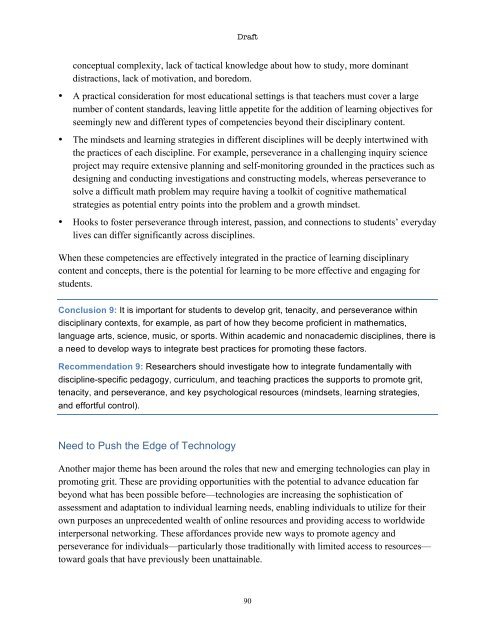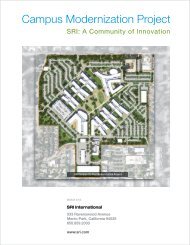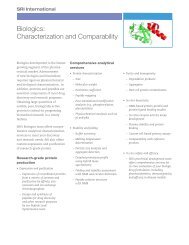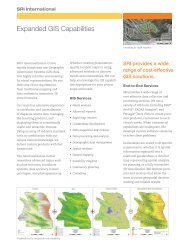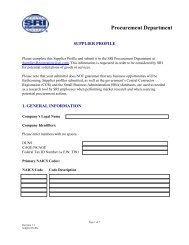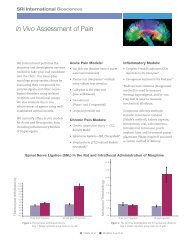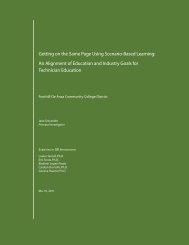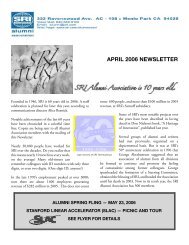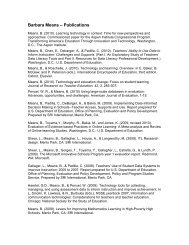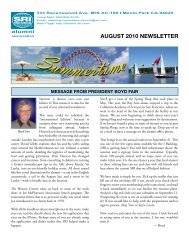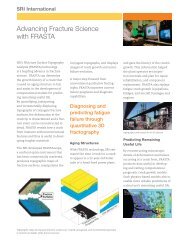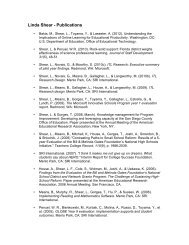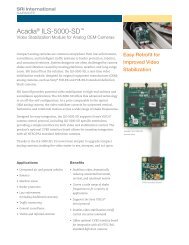Promoting Grit, Tenacity, and Perseverance - U.S. Department of ...
Promoting Grit, Tenacity, and Perseverance - U.S. Department of ...
Promoting Grit, Tenacity, and Perseverance - U.S. Department of ...
Create successful ePaper yourself
Turn your PDF publications into a flip-book with our unique Google optimized e-Paper software.
Draft<br />
conceptual complexity, lack <strong>of</strong> tactical knowledge about how to study, more dominant<br />
distractions, lack <strong>of</strong> motivation, <strong>and</strong> boredom.<br />
• A practical consideration for most educational settings is that teachers must cover a large<br />
number <strong>of</strong> content st<strong>and</strong>ards, leaving little appetite for the addition <strong>of</strong> learning objectives for<br />
seemingly new <strong>and</strong> different types <strong>of</strong> competencies beyond their disciplinary content.<br />
• The mindsets <strong>and</strong> learning strategies in different disciplines will be deeply intertwined with<br />
the practices <strong>of</strong> each discipline. For example, perseverance in a challenging inquiry science<br />
project may require extensive planning <strong>and</strong> self-monitoring grounded in the practices such as<br />
designing <strong>and</strong> conducting investigations <strong>and</strong> constructing models, whereas perseverance to<br />
solve a difficult math problem may require having a toolkit <strong>of</strong> cognitive mathematical<br />
strategies as potential entry points into the problem <strong>and</strong> a growth mindset.<br />
• Hooks to foster perseverance through interest, passion, <strong>and</strong> connections to students’ everyday<br />
lives can differ significantly across disciplines.<br />
When these competencies are effectively integrated in the practice <strong>of</strong> learning disciplinary<br />
content <strong>and</strong> concepts, there is the potential for learning to be more effective <strong>and</strong> engaging for<br />
students.<br />
Conclusion 9: It is important for students to develop grit, tenacity, <strong>and</strong> perseverance within<br />
disciplinary contexts, for example, as part <strong>of</strong> how they become pr<strong>of</strong>icient in mathematics,<br />
language arts, science, music, or sports. Within academic <strong>and</strong> nonacademic disciplines, there is<br />
a need to develop ways to integrate best practices for promoting these factors.<br />
Recommendation 9: Researchers should investigate how to integrate fundamentally with<br />
discipline-specific pedagogy, curriculum, <strong>and</strong> teaching practices the supports to promote grit,<br />
tenacity, <strong>and</strong> perseverance, <strong>and</strong> key psychological resources (mindsets, learning strategies,<br />
<strong>and</strong> effortful control).<br />
Need to Push the Edge <strong>of</strong> Technology<br />
Another major theme has been around the roles that new <strong>and</strong> emerging technologies can play in<br />
promoting grit. These are providing opportunities with the potential to advance education far<br />
beyond what has been possible before—technologies are increasing the sophistication <strong>of</strong><br />
assessment <strong>and</strong> adaptation to individual learning needs, enabling individuals to utilize for their<br />
own purposes an unprecedented wealth <strong>of</strong> online resources <strong>and</strong> providing access to worldwide<br />
interpersonal networking. These affordances provide new ways to promote agency <strong>and</strong><br />
perseverance for individuals—particularly those traditionally with limited access to resources—<br />
toward goals that have previously been unattainable.<br />
90


